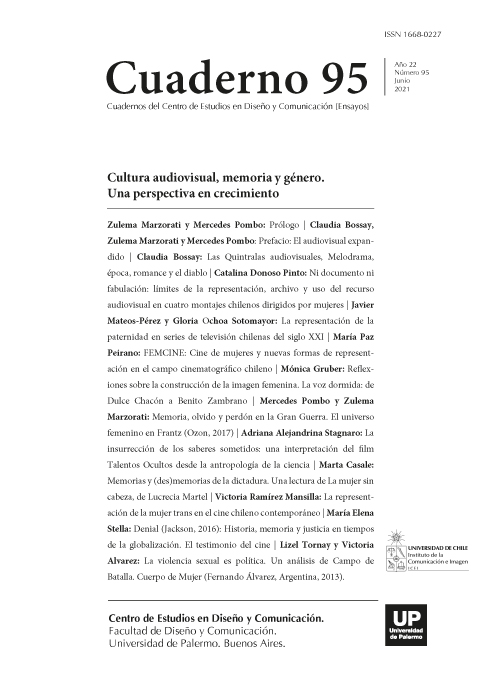La insurrección de los saberes sometidos: una interpretación del film Talentos Ocultos desde la antropología de la ciencia
Abstract
The purpose of the present work is to interpret the practices and social discourses emerged from the film Hidden talents directed by Theodore Melfi (2016), from the approach to the anthropology of science on the relationship between science, gender and power.
The film, a biographical film based on the book of not fiction Hidden Figures of Margot Lee Shetterly, rescues the scientific and personal trajectories of Katherine Johnson, Dorothy Vaughn and Mary Jackson as African American Accountants of the NASA, invisible, disadvantaged and segregated in an era stained by the struggle for the recognition of civil rights and social inclusion. The film revives and explores the human drama expressed by its double condition of women and people of African descent in a predominantly male scientific community interested in reversing the Soviet advance in the domain of space and develop competitively the space race in the United States.
The material provided by the film, very consistent with the book on which it is based, allows you to analyze not only the role of the woman as a maker of science, but go further in understanding their practices and scientific representations, analyzing their advances and limits in the production of knowledge, its specific features provided in the contents obtained and the type of knowledge located socially. In this sense, the anthropology of science, especially his from pioneers in the field of feminist and cultural studies, provides a specific background of theoretical treatment accorded to a large extent although not unanimously innovative concepts contributed by Foucault (1976) on the knowledge buried by a resurgent held by a few science.
References
Alic, M. [1986], (1991). El legado de Hipatia, Madrid: Siglo XXI.
Franklin, S. (1995) "The science as culture, the cultures of science" En: Annual Review of Anthropogy Volume 24.
Fischer, M. M.J. (2007) “Four Genealogies for a Recombinant Anthropology of Science and Technology” En: Cultural Anthropology. Volume 2. Issue 4. P 539-615
Foucault, M. [1976](1992). Microfísica del poder. Madrid: Las ediciones de La Piqueta
Foucault, M. [1976]2008) Historia de la sexualidad 1. La Voluntad del saber. Buenos Aires: Siglo XXI.
González García, M. I. y Pérez Sedeño, E, ( 2002). Ciencia, Tecnología y Género Número 2 / Enero - Abril
Haraway, Donna.J. (1989). Primate Visions: Gender, Race, and Nature in the World of Modern Science, Nueva York: Routledge.
Harding, S. [1986] (1995). Feminismo y ciencia, Barcelona: Morata
Harding, S. (1991). Whose Science? Whose Knowledge?, Ithaca, New York: Cornell University Press.
Jasanoff, S. (1990). The Fifth Branch: Science Advisors as Policy Markers. Cambridge. M.A.:Harvard University Press.
Martin, E. (1987). The Woman in the Body. Boston: Beacon Press
Perez Sedeño, E. (1994). “Mujeres matemáticas en la historia de la ciencia”. En Matemáticas y coeducación. OECM Ada Byron.
Rose, H. (1983), “Hand, Brain, and Heart: Towards a Feminist Epistemology for the Natural Sciences”, Signs: Journal of Women in Culture and Society 9: 73-96.
Rose, H. (1994). Love, Power and Knowledge: Towards a Feminist Transformation of the Sciences, Bloomington, IN: Indiana University Press.
Sayre, A. [1975] (1997). Rosalind Franklin y el ADN, Madrid: horas y HORAS
Shetterly, M. L. (2017). Talentos Ocultos. Estados Unidos de América: Harper Collins Español
Smith, D. (1974). “Women’s Perspective as a Radical Critique of Sociology”, Sociological Inquiry 44.
Strathern M. (1992). Reproducing the Future: Anthropology, Kinship and the New Reproductive Technologies. Manchester, UK: Manchester University Press
Traweek, S. (1988). Life Times and Beamtimes: The Word of High Energy Physicist. M.A.: Harvard University Press.
Watson, J. [1968] (1994). La doble hélice, Barcelona: Salvat
Los autores/as que publiquen en esta revista ceden los derechos de autor y de publicación a "Cuadernos del Centro de Estudios de Diseño y Comunicación", Aceptando el registro de su trabajo bajo una licencia de atribución de Creative Commons, que permite a terceros utilizar lo publicado siempre que de el crédito pertinente a los autores y a esta revista.


